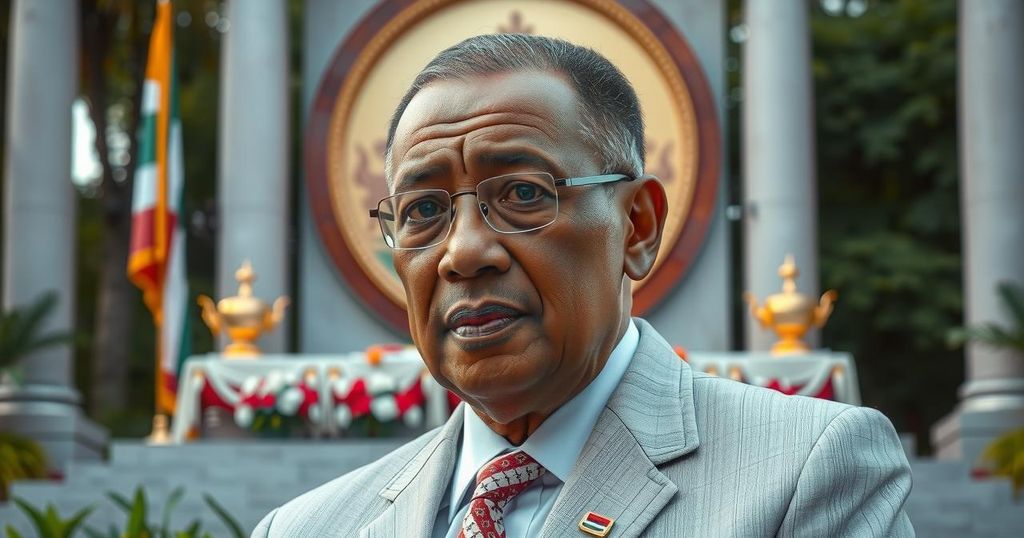Politics
BHARRAT JAGDEO, BOUTERSE, CORRUPTION, DE WARE TIJD, DEMOCRACY, DENIS CHABROL, DES, DESI BOUTERSE, DIPLOMATIC RELATIONS, FMR SURINAME, GUYANA, KHAN, NDP, NEW YORK, NORTH AMERICA, PARAMARIBO, PEOPLE ’ S NATIONAL CONGRESS REFORM, PNCR, ROGER ’ KHAN, SHAHEED ‘ ROGER ’ KHAN, SOUTH AMERICA, SURINAME, TRADE RELATIONS, UNITED STATES
Leila Ramsay
0 Comments
Former Suriname President Desi Bouterse Passes Away Amid Controversy
Desi Bouterse, former President of Suriname, died on December 24, 2024. He was convicted for the 1982 killings of political opponents and was serving a 20-year sentence. His death prompted public gatherings in Paramaribo, reflecting on his controversial legacy intertwined with human rights abuses and drug trafficking connections.
Desi Bouterse, the former President of Suriname, passed away on December 24, 2024, at the age of 79. Reports indicate that he died in his residence, having evaded legal repercussions for his past. Bouterse had been convicted for his role in the 1982 executions of several political opponents during his military rule and was serving a 20-year sentence for these crimes. Following his death, his body was transported to a funeral home in Paramaribo, triggering gatherings outside of his residence and the headquarters of his National Democratic Party (NDP).
Bouterse’s political career was marked by significant controversy. He initially came to power through a coup d’état in 1982 and served as the leader of Suriname until 1987. He later returned to political office as President after elections in July 2010. His tenure saw him maintain alliances with various political entities, including the main opposition party in Guyana, the People’s National Congress Reform (PNCR). Bouterse was known to have collaborated with Guyanese drug lord Shaheed ‘Roger’ Khan, signifying complex ties between political power and criminal elements in the region.
To contextualize Bouterse’s legacy, it is crucial to recognize the turbulent history of Suriname under his regime, characterized by human rights violations and political strife. The international community remained critical of his leadership, particularly concerning the impact of his actions on political stability in Suriname and the surrounding region. Diplomatic cables have revealed the extent of his connections with drug trafficking and his association with Khan, who was involved in significant criminal activity despite claims of helping prevent political upheaval against the then-government of Bharrat Jagdeo.
“Bouterse had enjoyed a close working relationship with Guyana’s main opposition People’s National Congress Reform (PNCR)” – Source.
The news of Desi Bouterse’s death draws focus to his controversial legacy. His role in Suriname’s politics has left a lasting impact, and public reactions highlight the complexities of his leadership, bridging the realms of governance and illicit activities. As tributes and reflections on his life arise, the considerations of justice, accountability, and political history remain salient themes that will likely dominate discussions surrounding his tenure.
The relevant links mentioned in this article include:
– [De Ware Tijd newspaper report on Desi Bouterse’s death](https://dewaretijd.com)
– [Information on Shaheed ‘Roger’ Khan and his drug trafficking](https://example-link.com)
In conclusion, the passing of Desi Bouterse marks a significant moment in Suriname’s history. While he is remembered by some as a leader who shaped the nation’s political landscape, he is also a figure closely associated with grave human rights abuses and criminal ties. His life and death encapsulate the broader struggles and complexities of governance in Suriname, underscoring the importance of understanding political accountability and the ramifications of past actions in shaping future narratives.
Desi Bouterse’s presidency and military rule in Suriname represent a tumultuous chapter in the country’s history. His regime was marked by allegations of human rights abuses, particularly the 1982 killings of political opponents, which have drawn continued scrutiny and condemnation. Bouterse’s return to power through democratic elections in 2010 further complicated perceptions of him, as it revealed a populace willing to overlook his past in favor of political stability. His interactions with neighboring political parties and connections to individuals involved in criminal activities illustrate the intricate web of politics and crime in the Caribbean region, prompting questions about the nature of power and governance.
The conclusion derived from Desi Bouterse’s death highlights the duality of his legacy as both a significant political figure and a controversial leader. With his past convictions and allegations casting a long shadow over his tenure, his life serves as a focal point for discussions on human rights, justice, and political legitimacy in Suriname. As reflections on his tenure emerge, it is crucial to critically assess the broader implications of his actions on contemporary governance and regional stability.
Original Source: demerarawaves.com




Post Comment